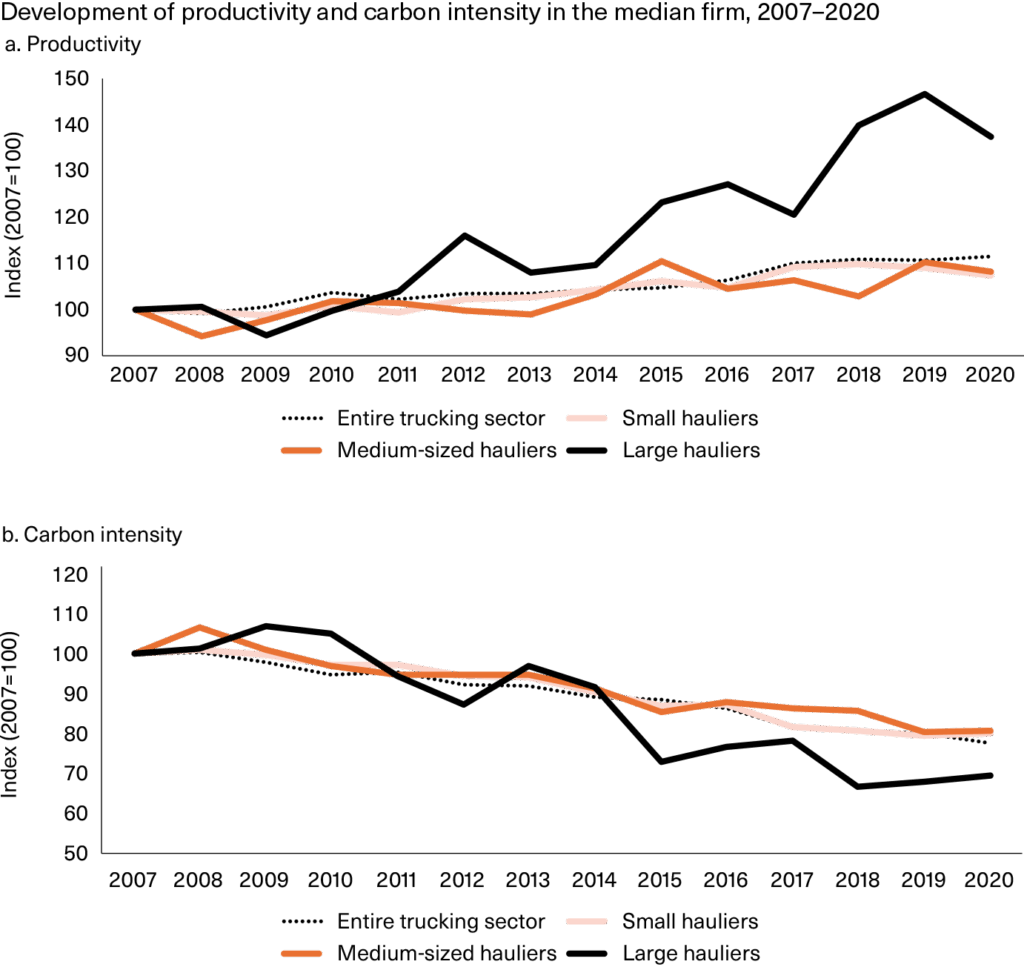Climate policy is sometimes presented as a threat to Swedish competitiveness. When taxes, emissions trading and biofuel requirements increase the cost of energy and transport, concerns are often raised about negative effects on firms and households. However, the experience of the Swedish trucking industry points in another direction. A sector long regarded as particularly exposed to rising fuel prices has instead become an example of how climate policy can promote efficiency and structural change.
This report analyses how the carbon tax and biofuel blending requirements have affected the structure, productivity and carbon emissions of Swedish trucking firms between 2007 and 2020. The analysis is based on unique panel data at the truck level linked to firm information, which allows us to identify how fuel costs influence vehicle use, productivity and emission intensity. The results provide important lessons for future climate policy – in particular how the transition can continue to strengthen both productivity and emission reductions.

“Market-based climate policy can raise efficiency already in the short term – but it requires stable and predictable policy conditions.”
Key results
Climate policy increased fuel costs. The climate policy component of the diesel price at the pump rose by more than 60 percent over the period and was the main driver behind the increase in Swedish diesel prices.
Productivity increased – emissions decreased. Firm-level productivity rose markedly, while carbon intensity fell by about 23 percent. Total emissions decreased by roughly 5 percent – despite higher transport volumes.
Large firms led the adjustment. The largest trucking firms responded most strongly to rising fuel costs, with productivity gains of about 37 percent and 30 percent lower carbon intensity. Smaller firms were less affected but followed the same pattern.
Efficiency gains without high market concentration. The sector became more consolidated, but most of the efficiency gains came from improved logistics, route optimization and the use of heavier vehicles – not from mergers or acquisitions.
Policy implications
Ensure long-term stability and predictability. Investments in efficiency, new technology and logistics solutions require stable and long-term policy frameworks. When instruments change abruptly – such as the recent reduction in the biofuel blending mandate – incentives are weakened and uncertainty increases.
Retain market-based instruments as the main tools. The carbon tax and biofuel blending requirements have proven to be effective, market-based instruments that send clear price signals without prescribing how firms should reduce emissions.
Support structural change towards more efficient firms. Larger and more productive trucking firms have been the main drivers of emission reductions and have increased their market shares. This development should not be counteracted through subsidies to smaller, less efficient firms. Any support should instead focus on transition and efficiency improvements.
Prepare for the EU’s new Emissions Trading System (ETS 2). The forthcoming EU emissions trading system for road transport will gradually increase the cost of fossil fuels. Swedish trucking firms and policymakers should prepare in time to safeguard competitiveness and avoid short-term volatility.
About the authors
Gustav Martinsson is Professor of Financial Economics at Stockholm University.
Per Strömberg is Professor of Financial Economics at the Stockholm School of Economics.
Christian Thomann is Associate Professor of Finance at the Royal Institute of Technology (KTH).